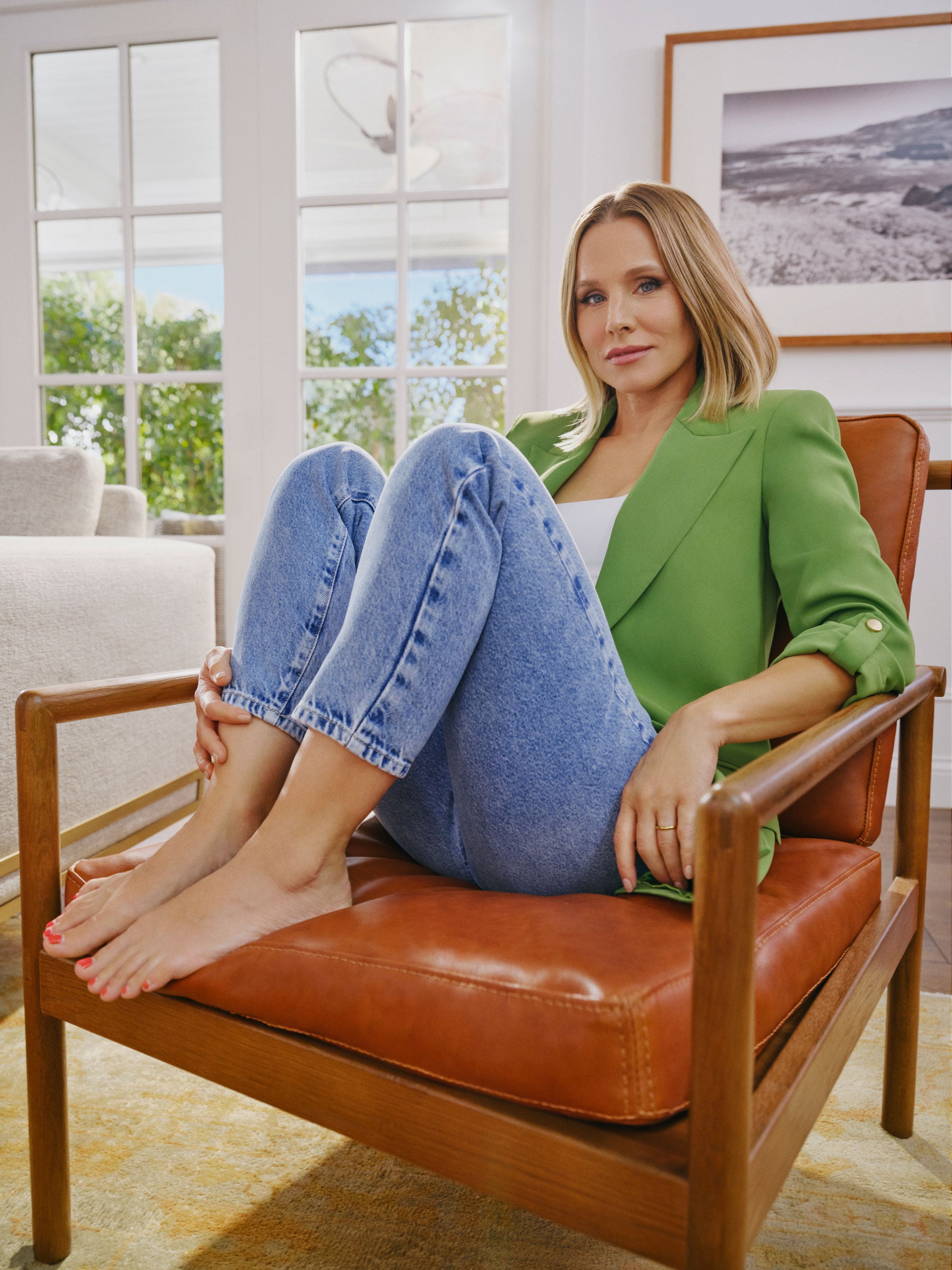How Kristen Bell Talks About Mental Health With Her Kids
- Being Outside Is Good For Your Body and Mind — Here’s Why - December 14, 2023
- The Chicest Bracelets for Women (All Under $100) - December 14, 2023
- Water Is Life — Here Are 11 Simple Ways to Drink More of It - December 14, 2023

Kristen Bell wasn’t always an open book about her mental health journey. “I suffered from what everyone else seems to suffer with, particularly here in America, which is: don’t talk about it, and it might go away,” Bell tells POPSUGAR in an exclusive interview.
It was actually thanks to her husband, Dax Shepard, that she became the mental health advocate she is now. “At some point, I was challenged by my husband to share [my experience] more openly and honestly because we sort of try to live by the tenants of [Alcoholics Anonymous] where we acknowledge our failures and share our vulnerabilities,” she says. That’s when she started talking publicly about suffering from anxiety and depression and how “I’m not always this bubbly person that you might see.”
After she started talking more openly about her depression and anxiety, she says she immediately felt as if a weight was lifted off her shoulders. “I just felt more authentic. I felt more responsible,” she says. “I know young girls look up to me, and I felt like, why would I not continue to be a part of this conversation?”
For some reason, we as a society are only comfortable talking about all the other tools, like: go on a walk, exercise more, eat better. And I just want to punch a giant hole in that stigma.”
Besides her husband, Bell says her mom had always cultivated a safe space to talk about mental health. “My mom is a nurse, and when I was growing up, she was very open and honest with me about taking an antidepressant,” she says. “And between her and I, I could talk about it, but to friends and family and publicly, I never could.” But as an adult, her mom said something that helped her let go of any lingering shame. “She said, ‘If you’re ever feeling this way,’ and described symptoms of anxiety and depression, ‘there is help out there for you. There are so many resources. There are a variety of techniques. And at some point, you might need a medication for it. That’s on the table. And if you do, don’t you dare feel shame because would you ever make someone with diabetes feel shame about taking their insulin?’ And that right sized everything in my head.”
Now, “The Good Place” star is partnering with the telehealth platform Hers as their first mental health ambassador to break down stigmas surrounding anxiety and depression — as well as provide easier access to resources. “It’s easy to go on a walk, it’s easy to eat more broccoli. It’s harder to find a doctor who will talk to you about these intimate and vulnerable subjects,” she says. “But with Hers, the whole goal is trying to make quality care for anxiety and depression accessible and available to everyone 24/7. You don’t have to feel like you’re out to sea or you are alone. There are tools all around you.”
With that in mind, Bell chatted with POPSUGAR about her mental health journey — from trying EMDR for the first time and explaining her anxiety and depression to her kids to deciding if SSRIs (aka “mommy’s brain broccoli”) were right for her.
This interview has been edited and condensed for clarity.

POPSUGAR: Everyone’s mental health is a unique — and oftentimes private — journey. Yet, you’ve made a point to share your experience with others. What was the catalyst that helped you decide to show this more vulnerable side of yourself?
Kristen Bell: When I hear responses, particularly from young girls, about how they felt empowered to seek help — whether that was getting more exercise, eating better, spending more time in nature, talking to a therapist, or getting a prescription for medication — it made me feel like I was having a positive effect on the world. So, I want to encourage people to take control of their mental health by sharing my story. Because I’ve had some really anxiety- and depression-riddled months in my life, and they’re miserable. I feel like I’m on pause, I’m so stagnant. Nothing tastes good, nothing looks good, I don’t want to do anything, and that’s such a miserable feeling. It is genuinely the foundation of my life. I have to take care of my mental health if anything on Earth is to be enjoyable at all.
POPSUGAR: How did you determine the right treatments or coping mechanisms that work for you?
KB: Sitting out in nature is supposed to reduce your anxiety, but at some point, I felt like it wasn’t enough, and that’s when I talked to a medical professional about what my options were. There are many different types of therapy that have helped me, like cognitive behavioral therapy. And I just started doing EMDR, which I’m really interested in, so we’ll see how that works. I was prescribed a medication and that, along with all my other tools, did the trick. But I feel like culturally, we still have a hangup when someone’s taking medication for their brain. For some reason, we as a society are only comfortable talking about all the other tools, like: go on a walk, exercise more, eat better. And I just want to punch a giant hole in that stigma. It is OK if you, under the care of a medical professional, try an SSRI, try any sort of medication. And only you will know your body.
PS: From your experience, why can’t mental health be approached the same way as the common cold? Here’s some medicine, breathe some fresh air, and you’re good to go.
KB: It’s all trial and error because everyone is different. And I don’t like it when people try to put anxiety and depression into a one-size-fits-all box. Certain people will have anxiety and depression for three months of their life and never again. Others will never experience it. Others will experience it from day one on Earth until the day they die. Everyone should have or should know that they have available to them a huge toolbox. Humans are a cornucopia of variables. So with Hers, the idea is being able to talk to someone one-on-one, tell them exactly your situation. It’s not like you can go to a website and be like, here’s the cure for anxiety or depression. It really has to be personalized because everyone’s experience is so different. Sometimes it’s genetics, sometimes it’s a trauma that’s been experienced. It has to be individualized because everyone experiences it in such a different way.
PS: Going back to what you said at the beginning about your mom — as a parent yourself, how do you talk to your kids about mental health? What do you hope they learn from you?
KB: All of it. They know . . . Wow. I mean, they really know everything. We’re very open and honest about Dax’s, my husband’s, recovery, and about the fact that mommy has anxiety and depression, that here’s what I feel like sometimes, and some days feel heavier than other days. And I have to make sure that I’m getting enough physical activity because that’s a huge one for me. And that I’m taking my medication at night. And basically, when they were young, I think I just described it as broccoli for my brain. This is my brain’s broccoli. This is what I keep my brain healthy with.
And since I was not heavy about how I spoke to them on the subject, I would hope that it’s just like any other thing. This is Mommy’s favorite chair. This is the TV show Mommy likes. This is the medication Mommy takes for her brain. I don’t want my kids to grow up feeling like this is a topic that’s off the table, that they should keep it secret.
Image Source: Courtesy of Hers